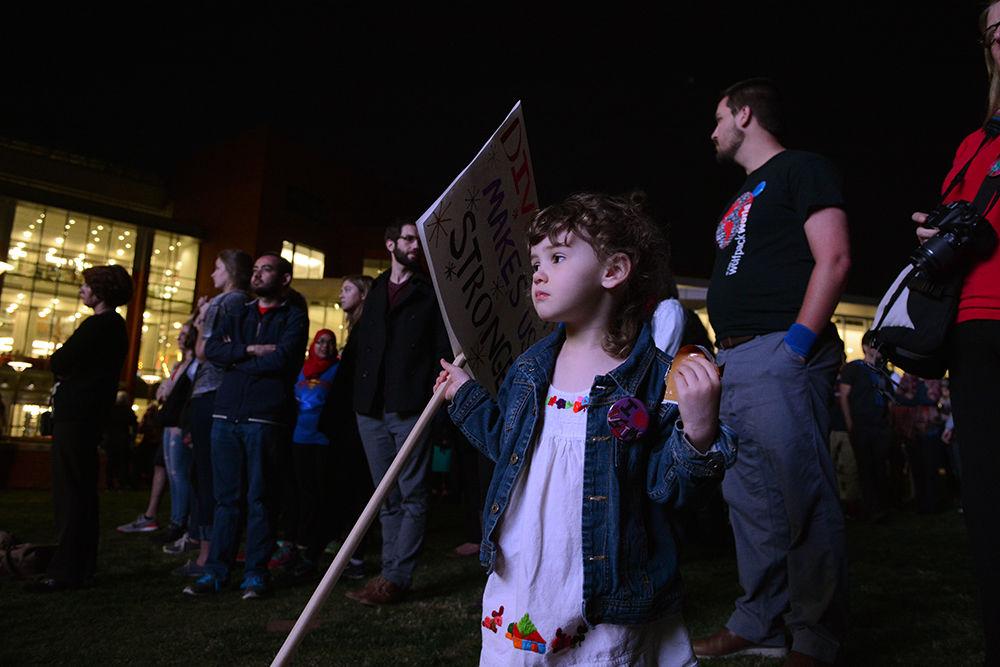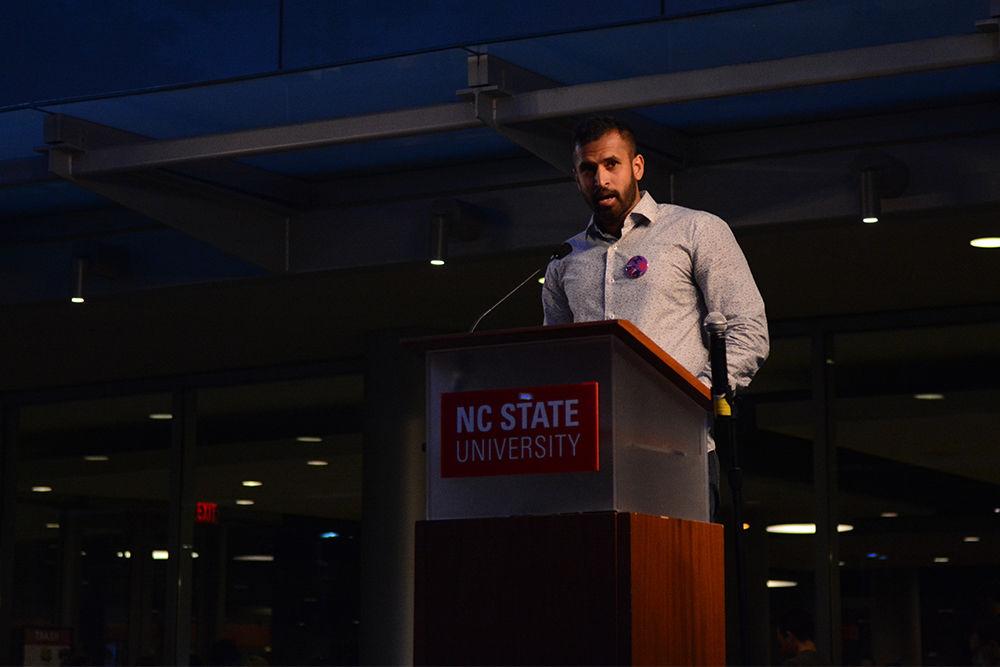The United not Divided rally Monday night brought students together in solidarity with marginalized groups to explore issues of diversity and tolerance. Speakers shared personal stories and poems regarding the climate of hostility toward immigrants, Muslims and many other groups, as well as providing messages of hope for students impacted by recent events.
Emcee of the event, Safi Ahmed, a senior studying computer science, said that the event was a forum for issues pertinent to more than just Muslims.
“This event is not only related to the ban on people coming into the country,” Ahmed said. “Social justice for all, that’s kind of what this is for… the Muslim minority is an oppressed people in a long line of oppressed people.”
The travel ban enacted by President Donald Trump’s administration, placed on seven Muslim-majority countries on Jan. 27, was a topic frequented by speakers. According to organizer Sinthia Shabnam, a sophomore studying political science and a member of the Muslim Students Association, the ban was part of the inspiration for the event.
“We felt that it was an opportunity for us to fight against this climate of fear that’s been happening with everyone, not just my minority group but other minority groups,” Shabnam said.
Zahra Asadi, a junior studying biochemistry, said that she knows people affected by the immigration ban, including a UNC-Chapel Hill professor, a family friend of hers who had trouble coming back to the United States from Iran.
President of the Muslim Students Association Mohammad Omary, a senior studying chemical engineering, said that part of the reason he wanted to organize the event was personal. He spoke of a Lebanese friend who recently changed his positive tone toward America.
“He always wanted to come to the United States and often labeled me as privileged, because I have the great opportunity to live in the United States and he does not,” Omary said. “[It] hit me really hard when he said a few weeks ago, ‘Bro, I’m not sure I want to come to America anymore’.”
Isra Jamil, a junior studying sociology, spoke of her family who immigrated to the United States about 20 years ago. She was born in Iraq, which is one of the countries on the travel ban list
She was raised in Charlotte and credits her upbringing with the adaptation and appreciation of many different cultures she has developed. When she found out Iraq was one of the countries on the travel ban list, she was hurt.
“I cried because it makes you feel like the place that you call home doesn’t want you here,” Jamil said.
The minute her family became citizens, they filed for her grandfather, who was diagnosed with Alzheimer’s disease, to join them in America for better access to health care.
“There is no health care [in Iraq], and some days you will wake up with no power or water,” Jamil said. “We filed for him to come to the United States and waited a year or two until he finally got an interview on Feb. 14 and they just cancelled it, just like that.”
Also speaking was Rupert Nacoste, professor of psychology, who addressed the idea of intersectionality, which he calls a buzzword that has gained popularity in the discussion about diversity.
“It is true, in our 21st century, if we pay attention, we can see the intersections of all of our lives,” Nacoste said.
He touched on a theme that many speakers addressed: a mentality of division will subvert a mission of unity.
“Forces of ‘us vs. them’ [are] starting to work against our ‘united not divided’ philosophy,” Nacoste said. “To be united, you must be guided by a common mission and vision of unity.”
On the topic of current attitudes on campus toward marginalized groups, Shabnam said that, having transferred from a school at which she really stood out and was not accepted, NC State provides a much more accepting environment.
“Being at NC State makes me feel so valued,” Shabnam said. “If anything, if someone is looking at me as different, they’re looking at what about me is different, and I hope that what about me is different is something good.”
Ahmed had a more tempered tone, saying that the Muslim community has seen a lot of support from students and the administration, but that there are still attitudes on campus that are hostile towards the community.
John Joseph, an alumnus of NC State, spoke about privilege and his experiences as a Muslim. He denounced the Trump administration for its efforts to limit the travel of people from majority-Muslim countries, and said that the momentum against these efforts was vital to building a united community.
“I stand here today with you as a man of privilege, saying that we must stay united together against hate,” Joseph said. “This momentum cannot stop.”
Jolie Hessenflow, a freshman studying chemistry, held a sign quoting a part of “The New Colossus,” which is found on the Statue of Liberty. She also spoke negatively of the travel ban.
“It is unacceptable to ban countries that did not deserve a ban,” Hessenflow said. “It’s unacceptable to deport people from the only country and the only world they have ever known.”
Hessenflow also expressed her disapproval for anti-Muslim rhetoric that has followed the election of Trump.
“I feel like since the election, it has been more acceptable for some people to voice opinions that would have previously been considered appalling to general society,” Hessenflow said. “The president says this so I can say this, too.”
Student Body President Paul Nolan was among the last to speak. He spoke on behalf of Student Government and the student body, letting the crowd in attendance know about the resources Student Government has made available for voters hoping to get more involved with the political process.
Nolan advocated for students to find out who their elected leaders are in the local, state and federal legislature. He emphasized the importance of contacting elected representatives in student efforts to effect change, and asked that everyone in the crowd add their representatives’ contact information to their cell phones.
He also mentioned that he has the phone numbers of Thom Thillis and Richard Burr, U.S. senators for North Carolina, on his speed dial.
Mike Mullen, vice chancellor and dean for the Division of Academic and Student Affairs, also spoke at the event on behalf of the NC State administration. He provided a message of support for marginalized groups and emphasized the importance of contacting local representatives.
Mullen also expressed the administration’s support of marginalized groups and the importance of learning from diversity, as well as the administration’s commitment to protecting students.
“We’ve pledged to support all of our students on campus and to try to make sure they know we are here to value them and to help them be successful, and to the extent possible, do that in an environment that is free of harassment,” Mullen said. “We are here to support and protect all of our students, whether they’re from North Carolina or they’re from another country.”
Safi Ahmed, a senior studying computer science, introduces the next speaker at the United Not Divided Ralley held on Stafford Commons on Monday. Ahmed worked as emcee during the rally and also led the prayer ritual that occurred halfway through the event.









